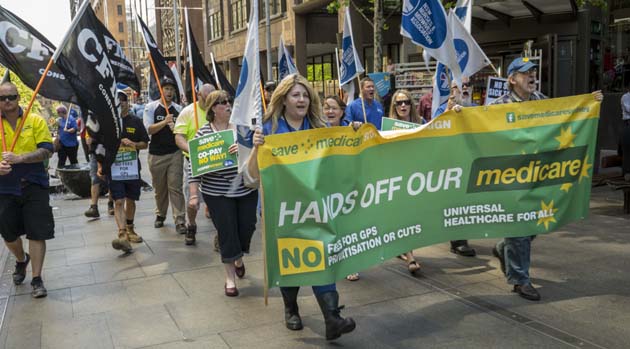The year has opened with a deeply humiliating defeat for Abbott’s health agenda. On 15 January brand new Health Minister Sussan Ley was forced to stop sunning herself on a cruise ship and front the media to announce that the $20 rebate cut for short GP visits was now “off the table”.
But both Abbott and Ley haave reiterated their commitment to a co-payment, with Abbott still promising, “more price signals in the system”.
The rebate cut was the first of three measures in Abbott’s co-payment “plan B” announced in December.
This was to replace the original $7 co-payment, dumped after a wave of opposition. Campaigning and public pressure through 2014 was sufficient to keep the populist Senators away from any compromises on Medicare.
But the “plan B” announced in December, described by Abbott as an “improvement”, is actually worse than the original co-payment plan.
Rebate cut defeated
Initially the rebate cut, the first of three “plan B” measures, looked like it would go under the radar. Labor, which has stridently opposed the $7 “GP tax”, initially sounded positive.
The regulation changes, scheduled to take effect on 19 January, reduced the rebate for visits lasting six to ten minutes from $37 to $16 – a cut of $21. The government claimed this would stop GPs churning through patients and end “six-minute medicine”.
Doctors that bulk-billed, and were simply paid the government rebate, would have faced a large loss of income. GPs recognised that this would lead to increased co-payments—which GPs already have complete discretion to charge—and force GPs to stop bulk-billing.
The implications for out-of-pocket health costs could have been dramatic. The standard rate set by the doctor’s association (the AMA) for a short visit is $75. Many patients would have faced paying $75 up-front and getting only $16 back from Medicare—a $60 real cost to check each earache or rash.
As the reality of this was grasped GPs began to revolt. The AMA’s position hardened dramatically as members’ outraged filtered through. AMA head Brian Owler described it as a “wrecking ball”, and the AMA began planning national rallies of GPs.
With the doctors leading the charge, momentum snowballed. The ACTU called a national day of action for Medicare in February. Labor announced its opposition to the plan and it became clear that the regulation would be struck down in the Senate. A revolt among Liberal back-benchers pushed Abbott into an embarrassing back-down.
Plan B
The other two changes are still on the table. The first effectively replaces the $7 co-payment with a $5 co-payment, by reducing the Medicare rebate by $5. Pensioners, concession card holders and those under 16-years-old would be exempt. The government says the co-payment is optional—but the choice for doctors is to lose money or charge a co-payment.
In addition, the rate of all Medicare rebate payments will be frozen until 2018 (this includes rebates for optometrists, specialist doctors and allied health workers like physiotherapists). Shamefully the rebate was also frozen by Labor Health Minister Tanya Plibersek in 2012. Continuing the freeze until 2018 is forecast to save the government $1.3 billion.
According to the Doctors’ Reform Society this will cut $3 from the rebate for each consultation by 2018, which would be on top of the $5 cut designed to introduce a co-payment.
It was the extended freeze on the Medicare rebate that pushed bulk-billing rates to a record low of 66 per cent under the Howard government, as more and more doctors shifted to setting their own fees.
The government’s defeat over short-visits has forced Minister Ley to announce a new round of consultation with the medical sector.
This means the prospect of a “Plan C” compromise that, if the government has any tactical sense, will try to incorporate the AMA who are not opposed to a co-payment in principle.
The government continues to argue that Medicare is growing unsustainably, and that bulk-billing is not for everyone.
The government remains committed to ending the universal basis of Medicare and replacing it with a two-tiered system of user-pays for the majority, and sub-standard bulk-billing for the poor. Defeating this is essential for stopping the Americanisation of Australia’s health system.
Our task is to ensure that Abbott’s health crisis leads to a confident and organised movement that will fight to expand and fully fund public, genuinely accessible healthcare. The AMA rally and the ACTU day of action called for February have both been cancelled.
But it would be a huge mistake if the ACTU does not call serious protests at some point this year—perhaps around the May budget. Protests and union action can capitalise on the government’s defeat and enshrine support for the full restoration and extension of Medicare.
By Jean Parker




